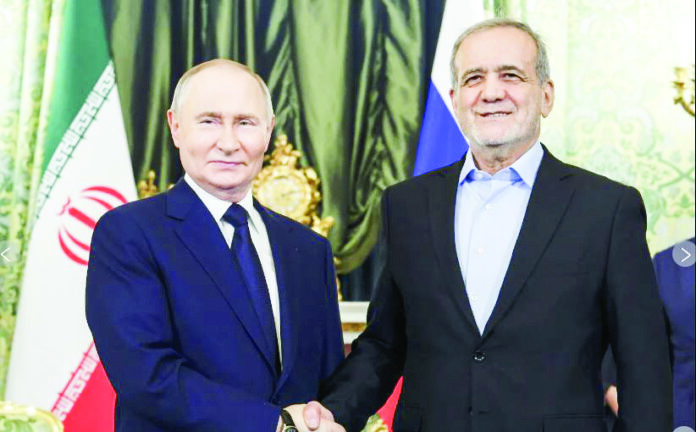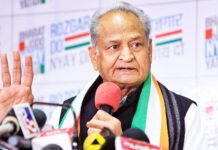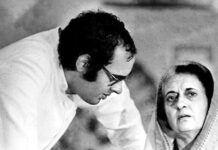
The good news emerging for Vladimir Putin, however, is that following years of two-track diplomacy, he has positioned himself as both a friend to Israel’s Benjamin Netanyahu and to the Iranian leadership.
LONDON: On the surface, Russia appears to be having a torrid time in the Middle East. First Syria now Iran. The fall of Bashar-al-Assad last year was a major blow to Russia’s reputation as a reliable ally. Since its military intervention in Syria in 2015, Moscow’s propaganda machine had positioned Russia as a guarantor of stability and protector of dictatorial regimes from external pressure and internal threats. The clear message from Moscow had always drawn parallels between Assad and the fates of American allies in the region, for example Hosni Mubarak, in an attempt to set the Kremlin against an “unreliable” Washington.
Seeking to increase its influence in the region, Moscow spent much of 2024 negotiating a bilateral trade and security partnership with Tehran. In the final draft, for the next 20 years the two countries agreed to expand economic cooperation, mitigate the impact of US sanctions, and strengthen military and political partnerships. The agreement was designed to govern relations between Russia and Iran, covering various areas such as defence, counter-terrorism, energy, finance and culture. Moscow was caught off guard by the overthrow of Assad’s government in Syria on 8 December last year, an event that hastened the formal agreement. The document was authorised by President Vladimir Putin and Iranian President Masoud Pezeshkian on 17 January. Putin then signed the treaty into Russian law on 21 April, the Iranian Parliament ratified it on 21 May and the all-important Iranian Guardian Council on 11 June. Israel attacked Iran overnight on the 12th.
When they planned to meet at the President Hotel close to the Kremlin last Wednesday, a group of Russian and Iranian policy officials probably didn’t anticipate just how timely their session on “Russian-Iranian cooperation in a changing world” would be. Seated around the table they were forced to confront a stark new reality. Iran’s regime, a key ally of Moscow, is facing its most serious threat in decades. So, what would the Kremlin do? Would Moscow provide arms to Tehran? After all, when Putin decided to attack Ukraine more than 3 years ago, Iran proved to be a reliable partner to the Kremlin, supplying Moscow with thousands of Shahed combat drones used to strike Ukraine when they were particularly crucial to Moscow’s war-fighting capability. Tehran also later sent instructors to Russia to help set up a drone production facility deep inside the Ural Mountains, based on Iranian designs. However, “despite repeated requests from the Iranian side for various types of weapons, such as air defence systems and fighter jets, none of this has been transferred to Iran by Russia to date”, Nikita Smagin, an independent expert on Russia-Iran ties, told the Guardian last week. “It has long been clear that Russia wouldn’t defend Iran militarily, because it is simply not prepared to risk confrontation with Israel and the United States for Iran’s sake”, he said.
Hanna Notte agrees. “The truth is that Russia has always had limits as to how far it would go in supporting Iran”, she wrote in the Atlantic last Wednesday. “The Kremlin’s obsessive anti-Western agenda elevated the Islamic Republic’s importance as a partner. But Putin still has other interests in the region—a longstanding, if complicated, relationship with Israel and a need to coordinate with OPEC on oil prices, for instance—and so remained mindful of Israeli and Gulf States’ red lines when it came to defence cooperation with Iran.”
Because of this, many are viewing the much-touted Strategic Partnership as toothless, even though it was paraded by Foreign Minister Sergei Lavrov as a new era of “security and defence cooperation.” The key thing is that it is not a formal military alliance, such as NATO, that requires members to come to each other’s assistance if they are attacked. Despite its vocal condemnation of Israeli strikes, Moscow has offered little more than rhetoric. Meanwhile, the Kremlin has largely decoupled its reliance on Iranian military support, having already acquired the expertise from Tehran to mass-produce drones domestically—as many as 2,700 per month.
While top officials in Moscow have described the situation in Iran as “alarming” and “dangerous”, Russian state media has also emphasised the potential upsides for the Kremlin, including surging oil prices and a welcome shift of global attention away from its grinding war in Ukraine. “Kyiv has been forgotten,” boomed a headline in the daily newspaper Moskovsky Komsomolets, capturing the Kremlin’s relief at the momentary change in narratives. Russian analysts have also pointed out that the renewed turmoil could open a diplomatic door for Moscow, especially if its offer to mediate between Israel and Iran is accepted. Such a role could allow President Putin to burnish his image as a regional peacemaker, despite international condemnation over Russia’s ongoing aggression in Ukraine. Experts warn, however, that the Kremlin might ultimately pay a steep price for its ambiguous posture. Writing in Kommersant, a daily business and political newspaper published in Russia, Andrei Kortunov warns that “the escalation of the conflict carries serious risks and potential costs for Moscow,” highlighting Russia’s limited ability or willingness to intervene on behalf of Iran.
The good news emerging for Vladimir Putin, however, is that following years of two-track diplomacy, he has positioned himself as both a friend to Israel’s Benjamin Netanyahu and to the Iranian leadership. This will make him an indispensable partner for the White House once Donald Trump, or his successor, embarks on the long process of patching up the new political realities of the Middle East in the wake of this war. Also, over 3 months of inconclusive negotiations with the Trump administration over ending the war in Ukraine, Russian negotiators are now insisting that Ukraine is just one part of a global package of military economic and political issues, where Washington’s fundamental interests could align with Moscow’s. As if to make the point, in the wake of Israeli strikes Vladimir Putin was the only world leader to speak by phone to Benjamin Netanyahu, Masoud Pezeshkian and Donald Trump.
For years, President Vladimir Putin has attempted to assume the role of a global player, where Moscow can stand alongside the United States and China as an arbiter of world affairs. Now he has the chance to boost his own standing as a power broker in the Middle East. In his call to Trump a week ago, Putin signalled Russia’s readiness to carry out “mediation efforts to de-escalate the crisis”, reminding Trump that Russia has actually been a long-time ally of the US throughout its years of negotiations with the Iranians over its nuclear programme. Earlier this year, Moscow offered to handle the enrichment of Iran’s nuclear fuel as part of a possible updated nuclear deal, thus allowing Iran to maintain a civilian nuclear programme while depriving it of any excuse to enrich uranium to weapons-grade.
If diplomacy takes a back-seat and after two weeks of deliberation President Donald Trump decides to bomb Iran’s deep nuclear facilities, thus starting a wider conflict, Putin’s ambition in Ukraine could actually be helped by a rising conflict between Israel and Iran. Not only would Moscow’s coffers be bulging because of an escalating oil price, but a major conflagration in the Middle East would occupy the bandwidth of the world’s media. “The world’s attention towards Ukraine will weaken”, tweeted Kremlin apologist Sergei Markov last week. “A war between Israel and Iran will help the Russian army’s success in Ukraine.”
So, whether diplomatic outcome or war, Putin wins. As one commentator put it recently: “There is no way that Putin could have predicted Israel’s full-scale attack on Iran months ago when he began stalling on Trump’s peace plan. But he has always had the devil’s own luck.”
*John Dobson is a former British diplomat, who also worked in UK Prime Minister John Major’s office between 1995 and 1998. He is currently a visiting fellow at the University of Plymouth.







